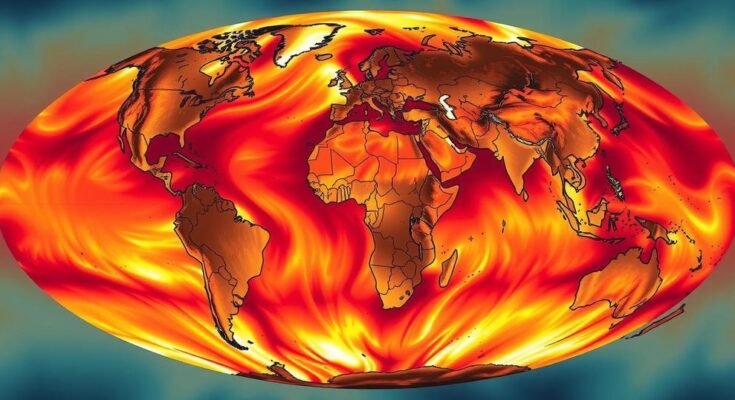In 2024, human-caused climate change resulted in an additional 41 days of dangerous heat globally. Scientists reported extensive links between climate change and various extreme weather phenomena, impacting millions and resulting in significant fatalities. Key regions faced unprecedented heat, raising alarms about the nearing tipping point of the Paris Agreement’s climate limits. Immediate action is needed to curb emissions and prepare for future climate challenges.
In 2024, human-induced climate change led to an alarming increase of 41 days of dangerous heat experienced globally. A study conducted by World Weather Attribution and Climate Central reported that this year has been marked by unprecedented temperature records and a significant rise in extreme weather events. The analysis highlighted that climate change exacerbated heat waves, droughts, and heavy rainfall, adversely affecting lives and livelihoods across various regions. “Climate change did play a role, and often a major role… destroying lives and livelihoods of millions” – Friederike Otto, lead researcher at World Weather Attribution.
This year witnessed severe heat impacts in numerous countries, including sweltering temperatures in Northern California, Mexico, and parts of West Africa, where vulnerable populations faced dire conditions. The unprecedented heat streak recorded in summer 2024 was likened to an alarming warning regarding the planet’s trajectory towards the climate targets established in the Paris Agreement. Results from the research were derived from a comprehensive analysis comparing 2024’s daily temperatures to expected averages without climate change, with the preliminary findings awaiting peer review.
The implications of the study are profound, particularly for the world’s most vulnerable nations, which are already experiencing extreme heat on a catastrophic scale. “The poorest, least developed countries on the planet are experiencing even higher numbers,” noted Kristina Dahl of Climate Central. Moreover, excessive heat events are lethal; deaths attributed to heat are often significantly underreported.
The year 2024 serves as a grim reminder of humanity’s proximity to breaching the 1.5 degrees Celsius warming limit set by the Paris Agreement. An investigation into 29 extreme weather events revealed that 26 of these catastrophic occurrences were directly linked to climate change. While the natural El Niño pattern contributed to this year’s unusual weather patterns, the long-term consequences of climate change were identified as having a more substantial impact on these extreme scenarios.
Experts assert that without a decrease in greenhouse gas emissions, extreme weather phenomena will persist and worsen. Jennifer Francis, a climate scientist, emphasized, “Extreme weather will continue to become more frequent, intense, destructive, costly, and deadly, until we can lower the concentration of heat-trapping gases in the atmosphere.”
Nevertheless, opportunities for mitigation exist, as highlighted by Julie Arrighi of the Red Cross. Nations may reduce the detrimental impacts of climate change through preparedness and adaptation efforts. Each nation bears responsibility in combating climate change, and that every bit of commitment from countries can contribute significantly to alleviating the adverse effects identified in recent studies.
The scientific understanding of climate change has evolved significantly, revealing its profound impact on global weather patterns. In light of increasing greenhouse gas emissions, researchers have noted a correlation between human activities and the prevalence of extreme weather events, characterized by higher temperatures, flooding, droughts, and other meteorological anomalies. The urgency surrounding the international climate crisis has prompted assessments aimed at understanding how many extreme weather events can be attributed directly to climate change and its ongoing implications for humanity and ecosystems.
In conclusion, the data presented by World Weather Attribution and Climate Central underscores the urgent and undeniable impact of climate change on global weather extremes, particularly the alarming increase in dangerous heat days. With meaningful links between anthropogenic activities and severe weather patterns, nations must take immediate actions to mitigate future incidences of climate-related tragedies. Climate change is not a distant concern; rather, it is a present danger that requires comprehensive collaboration and adaptive strategies across nations to protect vulnerable populations and ecosystems.
Original Source: www.detroitnews.com




